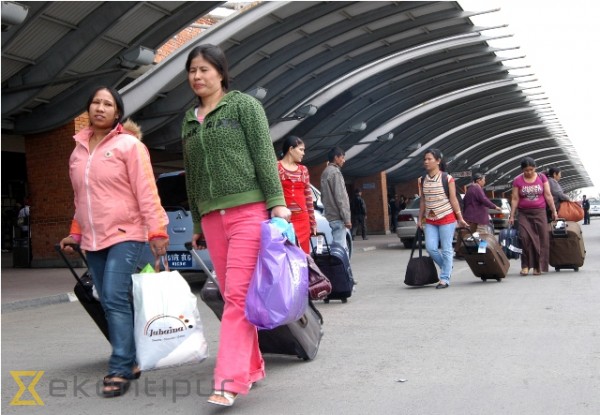
7 September 2015, Kathmandu Post
Free-visa-free-ticket is a newly enforced provision of the Government of Nepal that came into effect from July 8 this year. It basically obligates the employers from labour receiving countries to bear cost of visa processing and air ticket to hire workers from Nepal. Until now, most migrant workers took hefty loan to go to work abroad.
1. Who can benefit from the rule?
Only migrants going to work in seven countries—Malaysia, Qatar, Saudi Arabia, United Arab Emirates, Kuwait, Bahrain and Oman— will be entitled to such scheme. Nepal, however, has opened 110 countries as work destination. It is significant because these seven countries occupy almost 95 percent of documented Nepali migrant workforce (except India) in terms of current volume. An estimated 2.5 million Nepalis currently work in these seven countries.
2. Is it free or…?
Migrants will now have to bear the cost of pre-departure training, orientation, health check up and migrant workers’ welfare fund. This would be Rs 8,000 at the most. They many have to pay Rs 10,000 to recruiting agencies in service charge if their employers are not bearing the cost.
3. So, can I go to these countries paying just Rs 18,000 now?
It depends. Depends on when your job demand letter was accredited. In principle, you are eligible for the low cost recruitment if letter was accredited after July 8. Migrants going aboard in older demand letters will have to pay as per the old rule. According to Department of Foreign Employment, nearly 100,000 migrants taking jobs under older quotas will have to pay under old rule. Additionally, if you go to Malaysia, you may have to bear up to 20,000 extra.
4. What difference does this scheme make?
In fact, a huge difference. It will bring down the financial burden for migrant families by a huge margin—almost by 80 percent, according to some estimates. Earlier, most of the migrants were paying a minimum of Rs 70,000 to go to Gulf countries and Rs 80,000 to work in Malaysia, the maximum recruitment fee set by the government.
5. Why is it controversial then?
Mainly because the government didn’t consult with the government of destination countries before introducing the scheme. It also failed to take recruiting agencies into confidence. It will be difficult to enforce this provision without the cooperation from labour receiving countries and recruiting agencies.
6. Who are against it?
Some labour receiving government, majority of recruiting agencies in Nepal, and agents in work destination.
7. What do recruiting agencies want?
They want the government to take the labour receiving government into confidence before enforcing the provision.
8. Why is it ambitious?
For many reasons. First, nearly 90 percent of Nepali migrants go aboard with the help of recruiting agencies. So, it’s necessary to take them into confidence to enforce any new rule. Second, employers in work destinations are the one who bear the cost. It’s cannot be enforced without their cooperation.
9. Will this reduce demand for Nepali workers?
It is likely to discourage employers of smaller companies to hire workers from Nepal. But the new rule does not make any big difference for big employers. Most employers, especially in Qatar and Bahrain, had been offering free visa and ticket even before the system came into effect. But recruiting agencies in Nepal continued to extort money.
Even if the demands fall, it won’t affect Nepal much as we have been able to supply only half of the total demand, according to government data.
Moreover, Nepali workers are favourites of many employers as they come much cheaper than other workers. Nepalis are favoured over other nationalities for certain jobs. Malaysia, for instance, hires only Nepali workers in the country’s security industry.
10. What should be done for its strict implementation?
First, sign an agreement with labour receiving countries incorporating the new scheme. Second, develop a mechanism that mandates migrants to pay recruitment fee directly to the government’s front line office instead of agencies or agents. Third, introduce stricter monitoring mechanism, harsher punishment measures for fraudulent agencies. Finally, expand state’s presence at the rural level.